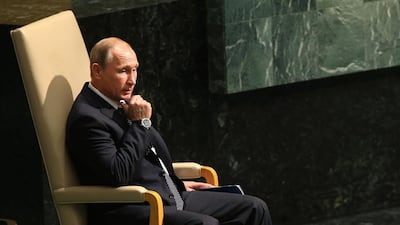BEIRUT // When global attention turned to Russia’s deployment of troops, combat aircraft and tanks to Syria’s Latakia province earlier this month, Moscow and Damascus defended the military build-up as part of the fight against ISIL.
But in recent days, Russian president Vladimir Putin has confirmed widespread international concerns that his country’s military deployments to Syria is about more than fighting ISIL — it’s about ensuring the survival of the regime of Syrian president Bashar Al Assad.
The revealing of Mr Putin’s hardline stance on Syria’s government has put Russia and the United States — which previously said it would welcome Moscow’s participation in the fight against ISIL, but maintains that Mr Al Assad must go — at an impasse.
Earlier this week, Mr Putin finally laid out Russia’s intentions for Syria and hinted at what Russian military intervention will look like.
In an interview aired on Sunday night by CBS’ 60 Minutes, host Charlie Rose asked Mr Putin about allegations that Moscow’s military deployment was aimed at saving Syria’s government, and not just countering ISIL. “Well, you’re right,” Mr Putin said. “We support the legitimate government of Syria.”
“There is no other solution to the Syrian crisis than strengthening the effective government structures and rendering them help in fighting terrorism,” he added.
Mr Putin’s disclosure came shortly after Iraq announced that Russia, Iraq, Iran and Syria had reached a deal to share intelligence.
On Monday, Mr Putin took to the podium at the United Nations General Assembly in New York, again defending the Syrian government and Russia’s intervention in Syria’s war.
“We think it is an enormous mistake to refuse to cooperate with the Syrian government and its armed forces, who are valiantly fighting terrorism face to face,” he said.
Mr Putin has painted Russian military involvement as limited, telling 60 Minutes that ground troops are not currently part of Russia’s plan. “Well, at least we don’t plan on it right now,” he said.
Speaking to reporters on Monday, Mr Putin said air strikes could still be on the table for Russia, but that his country would only conduct air strikes legally with an invitation from the Syrian government and approval from the UN’s security council. The statement was a jab at the US’ military action against ISIL.
At the UN General Assembly, Mr Putin also called for a “broad coalition against terrorism” akin to the allies in the Second World War.
“Similar to the anti-Hitler coalition, it could unite a broad range of forces that are resolutely resisting those who, just like the Nazis, sow evil and hatred of humankind,” he said.
With Mr Putin’s staunch support for Mr Al Assad, establishing an international coalition as broad in scope as the allies in the Second World War will be difficult.
Despite the widespread misgivings about Mr Putin’s intentions in Syria, there were shreds of hope that the sudden flurry of diplomatic activity surrounding Russia’s deployment could make progress in bringing the conflict to an end.
In short order, Russia emerged at the centre of diplomacy surrounding Syria. Discussions on military cooperation were set up with the US and Israel. And on Monday, Moscow said Russia, the US, Iran, Saudi Arabia, Turkey and Egypt would take part in Syria peace talks next month.
Up until a few days ago, the US tone on Russia’s involvement in Syria was concerned and cautious, yet optimistic that ISIL could contribute to efforts against ISIL.
But the current, hostile spat between the two countries over the future of Mr Al Assad — and Russia’s increased flirtations with countries like Iran — makes any meaningful coordination or an agreement on Syria between the two countries appear to be a hard and perhaps unlikely bargain.
Speaking at the General Assembly before Mr Putin on Monday, US president Barack Obama reaffirmed that the US was willing to work with Iran and Russia to end the war in Syria, but also emphasised his belief that Mr Al Assad was a dictator who bore responsibility for much of the bloodshed in Syria and must go.
He attacked Russia’s argument that supporting Syria’s government was the only way to defeat terrorism, saying “in accordance with this logic, we should support tyrants like Bashar Al Assad, who drops barrel bombs to massacre innocent children, because the alternative is surely worse.”
foreign.desk@thenational.ae

